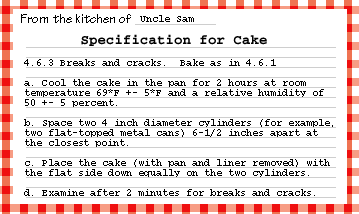Archive
CHAPTER THREE: Cutting Red Tape
Christmas brought more than holiday cheer to America's defense forces. Year after year, they could count on a lighthearted, though embarrassing, story in the newspapers as well. The source: the Pentagon's specifications for approving fruitcake.
At Vice President Gore's town hall meeting at the Pentagon's courtyard in August 1993, a Defense Department employee rose to complain about the department's cumbersome specification for chocolate chip cookies. Sitting in the audience was Jeff Jones, an assistant deputy undersecretary of defense, who decided to confront the issue of food specifications. Shortly after that meeting, he was asked to approve another specification -- this one for cake mix.
The proposed "spec" read:

As the Vice President said later, "I think I might rather eat a cake that failed that particular test."
Jones had his own idea about approving cake mix. Though novel at the Pentagon, his method is used widely in homes across America -- TASTE the cake! If you like it, great. If you don't, get another cake mix. With the help of Deputy Under Secretary James Klugh and Logistics Staff Analyst Sherrie McNeil, the Pentagon scrapped all military specifications for mess hall food and is buying real food.
Nothing more easily evokes laughter than stories about government red tape. And no department has been more closely associated with excessive, if not comical, regulations than Defense. But something is happening at the famed five-sided building in northern Virginia. Now, with Defense Secretary Perry's enthusiasm, Defense employees are seeking to cut red tape, transforming long processes into a few steps.
The Air Force, for instance, used to have nearly 1,600 separate regulations that covered 55,000 pages. Led by General Tony McPeak, however, a team of employees converted those regulations into 160 policy statements, each of them about three pages long and available on CD-ROM. Accompanying them is an instruction handbook.
DOD employees fill out travel vouchers 11.7 million times a year -- 45,000 times a day! Until recently, the payment approval process forced employees to go from office to office in a 17-step nightmare that could last three weeks. As Air Force Captain Rod Berk put it, "It seems sometimes they do more traveling getting their orders done than they do when they actually get on the plane." [3]
Then a Pentagon automation team that Berk led used the latest in automation to cut the 17 steps down to four and the three weeks down to a day. It also shifted the responsibility for keeping any back-up paperwork to the employees. When the Defense Department uses this system for all of its travel, it will save $1 billion over five years.
Such efforts build upon one another. Consider the words of Wilett Bunton, an Army employee whose complaints about the travel process helped to spur the changes: "We're not the same people we were six months ago." [4]
From procurement in general to the Pentagon travel office in particular, federal workers are cutting red tape across a wide variety of processes, making it easier for federal workers to do their jobs and for the American people to get the service they deserve. If federal workers aren't the same as they were six months ago, neither are the rules and regulations that tied them in knots.